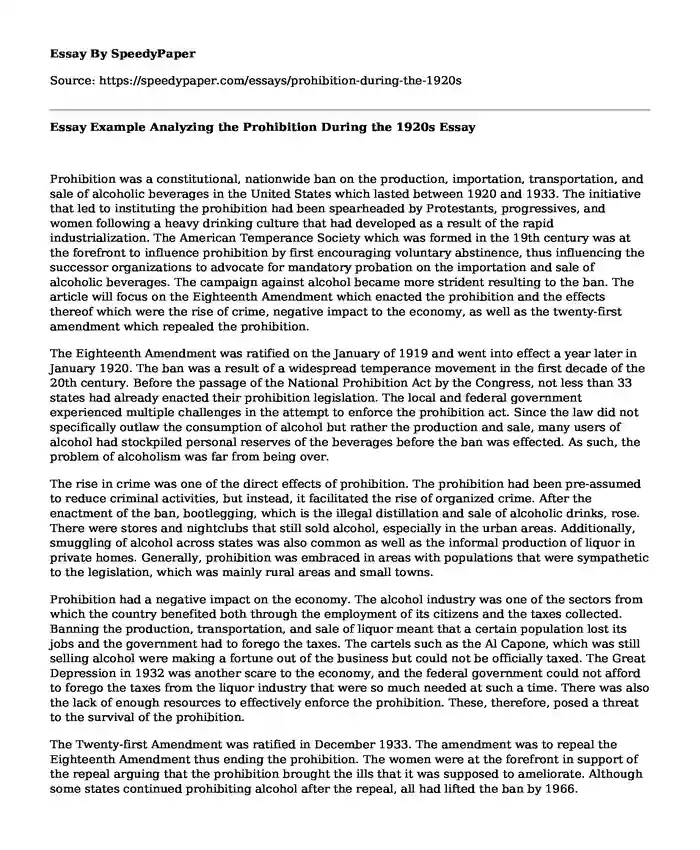
| Type of paper: | Essay |
| Categories: | United States Law |
| Pages: | 3 |
| Wordcount: | 599 words |
Prohibition was a constitutional, nationwide ban on the production, importation, transportation, and sale of alcoholic beverages in the United States which lasted between 1920 and 1933. The initiative that led to instituting the prohibition had been spearheaded by Protestants, progressives, and women following a heavy drinking culture that had developed as a result of the rapid industrialization. The American Temperance Society which was formed in the 19th century was at the forefront to influence prohibition by first encouraging voluntary abstinence, thus influencing the successor organizations to advocate for mandatory probation on the importation and sale of alcoholic beverages. The campaign against alcohol became more strident resulting to the ban. The article will focus on the Eighteenth Amendment which enacted the prohibition and the effects thereof which were the rise of crime, negative impact to the economy, as well as the twenty-first amendment which repealed the prohibition.
The Eighteenth Amendment was ratified on the January of 1919 and went into effect a year later in January 1920. The ban was a result of a widespread temperance movement in the first decade of the 20th century. Before the passage of the National Prohibition Act by the Congress, not less than 33 states had already enacted their prohibition legislation. The local and federal government experienced multiple challenges in the attempt to enforce the prohibition act. Since the law did not specifically outlaw the consumption of alcohol but rather the production and sale, many users of alcohol had stockpiled personal reserves of the beverages before the ban was effected. As such, the problem of alcoholism was far from being over.
The rise in crime was one of the direct effects of prohibition. The prohibition had been pre-assumed to reduce criminal activities, but instead, it facilitated the rise of organized crime. After the enactment of the ban, bootlegging, which is the illegal distillation and sale of alcoholic drinks, rose. There were stores and nightclubs that still sold alcohol, especially in the urban areas. Additionally, smuggling of alcohol across states was also common as well as the informal production of liquor in private homes. Generally, prohibition was embraced in areas with populations that were sympathetic to the legislation, which was mainly rural areas and small towns.
Prohibition had a negative impact on the economy. The alcohol industry was one of the sectors from which the country benefited both through the employment of its citizens and the taxes collected. Banning the production, transportation, and sale of liquor meant that a certain population lost its jobs and the government had to forego the taxes. The cartels such as the Al Capone, which was still selling alcohol were making a fortune out of the business but could not be officially taxed. The Great Depression in 1932 was another scare to the economy, and the federal government could not afford to forego the taxes from the liquor industry that were so much needed at such a time. There was also the lack of enough resources to effectively enforce the prohibition. These, therefore, posed a threat to the survival of the prohibition.
The Twenty-first Amendment was ratified in December 1933. The amendment was to repeal the Eighteenth Amendment thus ending the prohibition. The women were at the forefront in support of the repeal arguing that the prohibition brought the ills that it was supposed to ameliorate. Although some states continued prohibiting alcohol after the repeal, all had lifted the ban by 1966.
In summary, prohibition was a ban on the sale and distribution of alcoholic beverages in the USA from 1920 to 1933. It resulted in organized crimes, a negative effect on the economy, which led to the repeal in 1933.
Cite this page
Essay Example Analyzing the Prohibition During the 1920s. (2022, Apr 20). Retrieved from https://speedypaper.net/essays/prohibition-during-the-1920s
Request Removal
If you are the original author of this essay and no longer wish to have it published on the SpeedyPaper website, please click below to request its removal:
- Essay Sample on Managerial Accounting for Apple Inc. Activity-Based Costing
- Free Essay: Quantitative Nursing Research Critique
- Resume - Free Essay Example
- Reflection Paper Sample for Social Psychologist
- Analysis Essay Example on The Man Who Thought Himself a Woman
- Paper Example on Modern Moral Philosophy
- Opioids Deaths Among the African American Community Relative to Mental Health - Free Essay
Popular categories




